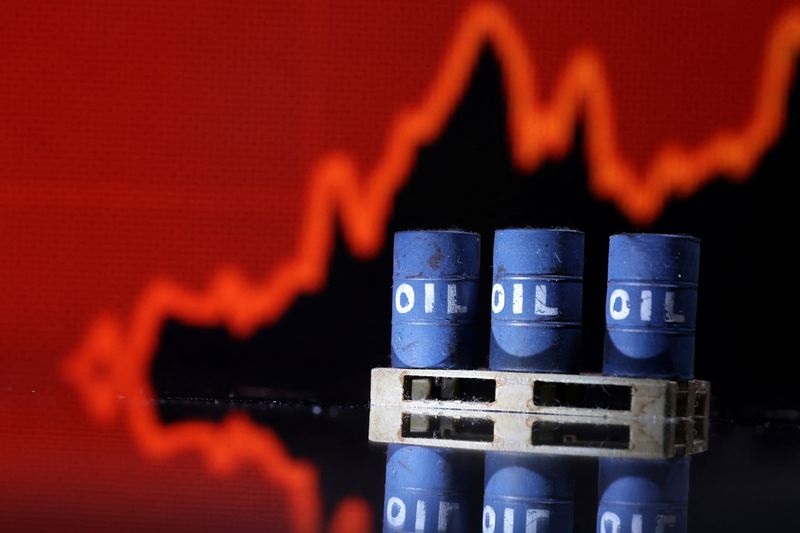© Reuters
Investing.com – With the imposition of a cap on Russian oil purchases, China appears to be starting to recalculate amid Washington’s temptations for Beijing and India to take advantage of the cap.
According to reports, buyers in China have suspended their purchases of Russian oil as they await details of a US-led cap to see if it offers a better price.
International reports revealed that many shipments of Russian ESPO crude for cargo in December are still unsold, pending details on the new price cap.
According to reports, there is reluctance among Chinese buyers and sellers to exit positions before more clarity is known about the level of the price top, according to traders familiar with the matter.
Undisclosed support
Bloomberg says traders and many market participants seem willing to point to a price cap, even if they don’t officially support it, as long as the level is not far from current prices.
However, if the level is too low, the party responsible for transport and insurance coverage – which can be the seller or the buyer, depending on the terms of the contract – may have to request services from non-EU suppliers, complicating the procedural process and drastically altering the economic deal.
The cap is designed to keep OPEC+ producer crude flowing to avoid a global supply shock, but squeeze revenue for the Kremlin as it wages war in Ukraine.
strangle Russia
In addition to the problems for buyers, banks financing crude oil purchases fear looming penalties and higher freight rates.
Service providers are assessing their potential exposure to EU sanctions and how best to circumvent the restrictions when they take effect in less than two weeks.
China and India have become vital outlets for Russian crude after most other buyers shunned OPEC+ product following the invasion of Ukraine.
However, Russia has reiterated it will not sell to countries enforcing the cap and, instead, Moscow will redirect supplies to “market-oriented partners” or cut production, according to Deputy Prime Minister Alexander Novak.
Historic business
China and Qatar have signed a historic $60 billion deal to purchase liquefied gas from Qatar as the world’s second-largest economy has sought to boost energy security for decades.
Qatar Energy has announced that it will send Sinopec 4 million tons of LNG annually, starting in 2026.
The deal will run for 27 years, making it China’s longest LNG supply contract to date and one of the country’s largest deals by volume.
Europe is trying to move away from Russian gas that comes to it through pipelines, relying on liquefied natural gas, despite stalled talks with Qatar and the reluctance of countries like Germany to commit to long-term contracts.
possible ceiling
The limit aims to reduce Russia’s oil revenues by keeping Russian crude on the market by denying insurance, shipping services and financing from Western allies for tanker shipments priced above a fixed cap of one dollar per barrel.
Russia’s Ural historical average of $63-64 a barrel could be an upper limit.
The cap is a concept promoted by the United States since the European Union first unveiled plans in May for a Russian oil embargo to punish Moscow for its invasion of Ukraine.
The Temptation of Washington
The US Treasury secretary said on the sidelines of the G20 summit in Bali that a cap on Russian oil prices would benefit buyers.
Yellen said the Russian oil price cap would benefit China, as Chinese purchases of Russian oil are “fully in line” with Western countries’ plans to keep Russian crude in the global market.
The US Treasury secretary added that Beijing and India will benefit from the new price cap mechanism that will be imposed in December, in an attempt to woo the big importers.
Russian threat
Once again, the Russian authorities reiterated their guidance regarding a complete cessation of oil sales, as well as a significant reduction in production if a decision on Russian oil price caps is triggered.
The Russian deputy prime minister said his country had no plans to export crude oil or petroleum products to countries that have capped oil prices.
In an official statement, Alexander Novak said Russia will redirect its oil supplies to its partners who use the market to fix prices or reduce its crude output.
The Russian Deputy Prime Minister said: “Put a ceiling on the price of Russian oil will lead to a decline in investment and a possible shortfall in the supply of crude oil and any commodity that assists in the application of this mechanism.”
Alexander Novak added that Moscow pledged not to export oil to any country that caps Russian oil prices.
Anxiety stocks go up
Goldman Man Sachs said the “lack of clarity on the implementation of the G7 price cap” could add to market anxiety, especially with Russia’s oil price cap looming on Dec. 5.
The EU energy policy chief said the EU expected to finalize its regulations in time to implement the G7 plan to cut the price of Russian crude on December 5.
“We continue to believe that Russian production will decline by about 0.6 million bpd from here, with the risk of deeper and more abrupt outages,” the bank said.
Europe’s meager crude inventories are dwindling as refiners (TADAWUL:) stockpile before the European Union’s ban on Russian crude takes effect on Dec. 5.
This has helped put pressure on crude oil prices, putting pressure on physical crude markets in Europe, Africa and the United States.


